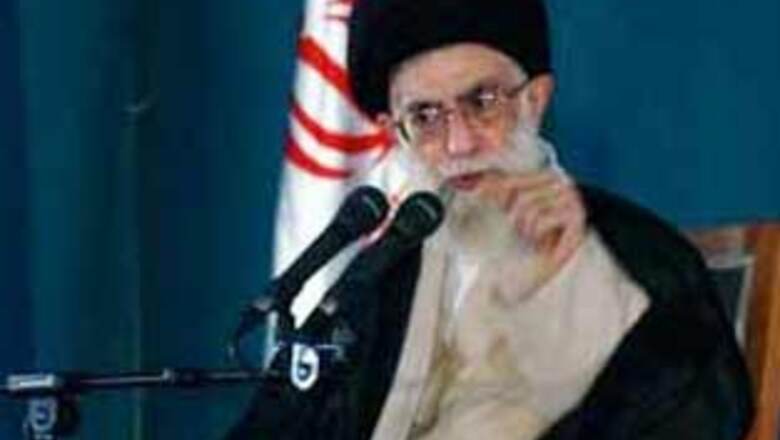
views
Tehran: Iran's supreme leader rebuffed President Barack Obama's latest outreach on Saturday, saying Tehran was still waiting to see concrete changes in US policy.
Ayatollah Ali Khamenei was responding to a video message Obama released on Friday in which he reached out to Iran on the occasion of Nowruz, the Persian new year, and expressed hopes for an improvement in nearly 30 years of strained relations.
Khamenei holds the last word on major policy decisions, and how Iran ultimately responds to any concrete US effort to engage the country will depend largely on his say.
In his most direct assessment of Obama and prospects for better ties, Khamenei said there will be no change between the two countries unless the American president puts an end to US hostility toward Iran and brings "real changes" in foreign policy.
"They chant the slogan of change but no change is seen in practice. We haven't seen any change," Khamenei said in a speech before a crowd of tens of thousands in the northeastern holy city of Mashhad.
In his video message, Obama said the United States wants to engage Iran, but he also warned that a right place for Iran in the international community "cannot be reached through terror or arms, but rather through peaceful actions that demonstrate the true greatness of the Iranian people and civilization."
Khamenei asked how Obama could congratulate Iranians on the new year and accuse the country of supporting terrorism and seeking nuclear weapons in the same message.
Khamenei said there has been no change even in Obama's language compared to that of his predecessor.
"He (Obama) insulted the Islamic Republic of Iran from the first day. If you are right that change has come, where is that change? What is the sign of that change? Make it clear for us what has changed."
Still, Khamenei left the door open to better ties with America, saying "should you change, our behavior will change too."
Diplomatic ties between the US and Iran were cut after the US Embassy hostage-taking after the 1979 Islamic Revolution, which toppled the pro-US shah and brought to power a government of Islamic clerics.
The United States cooperated with Iran in late 2001 and 2002 in the Afghanistan conflict, but the promising contacts fizzled — and were extinguished completely when Bush branded Tehran part of the "Axis of Evil."
Khamenei enumerated a long list of Iranian grievances against the United States over the past 30 years and said the US was still interfering in Iranian affairs.
He mentioned US sanctions against Iran, US support for Iraqi dictator Saddam Hussein during his 1980-88 war against Iran and the downing of an Iranian airliner over the Persian Gulf in 1988.
He also accused the US of provoking ethnic tension in Iran and said Washington's accusations that Iran is seeking nuclear weapons are a sign of US hostility. Iran says its nuclear program is only for peaceful purposes, like energy production, not for building weapons.
"Have you released Iranian assets? Have you lifted oppressive sanctions? Have you given up mudslinging and making accusations against the great Iranian nation and its officials? Have you given up your unconditional support for the Zionist regime? Even the language remains unchanged," Khamenei said.
Khamenei, wearing a black turban and dark robes, said America was hated around the world for its arrogance, as the crowd chanted "Death to America."
Prominent political analyst Saeed Leilaz said Khamenei's comments did not amount to a rejection of better ties with the Obama administration. Rather, Iran's current hard-line leaders need to publicly maintain some degree of anti-U.S. rhetoric to bolster their own position, especially with their conservative base, he said.
"Iran's ruling Islamic establishment needs to lessen tensions with the U.S. and at the same time maintain a controlled animosity with Washington," he said. "Iran can't praise Obama all of a sudden."
Khamenei will also likely stand his ground as long as he remains concerned about the United States' ability to destabilize Iran, he said.
For its part, the Obama administration must take practical steps such as lifting a ban on selling Iran spare parts for passenger aircraft or considering unfreezing Iranian assets in the US, Leilaz said.
Obama has signaled a willingness to speak directly with Iran about its nuclear program and hostility toward Israel, a key US ally. At his inauguration last month, the president said his administration would reach out to rival states, declaring "we will extend a hand if you are willing to unclench your fist."
"They say we have stretched a hand toward Iran. ... If a hand is stretched covered with a velvet glove but it is cast iron inside, that makes no sense," Khamenei said.




















Comments
0 comment